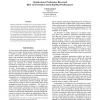Free Online Productivity Tools
i2Speak
i2Symbol
i2OCR
iTex2Img
iWeb2Print
iWeb2Shot
i2Type
iPdf2Split
iPdf2Merge
i2Bopomofo
i2Arabic
i2Style
i2Image
i2PDF
iLatex2Rtf
Sci2ools
BIRTHDAY
2015
Springer
2015
Springer
Upside-Down Preference Reversal: How to Override Ceteris-Paribus Preferences?
Specific preference statements may reverse general preference statements, thus constituting a change of attitude in particular situations. We define a semantics of preference reversal by relaxing the popular ceteris-paribus principle. We characterize preference reversal as default reasoning and we link it to prioritized Pareto-optimization, which permits a natural computation of preferred solutions. The resulting method simplifies elicitation, representation, and utilization of complex preference relations and may thus enable a more realistic preference handling in personalized decision support systems and in preference-based intelligent systems.
| Added | 17 Apr 2016 |
| Updated | 17 Apr 2016 |
| Type | Journal |
| Year | 2015 |
| Where | BIRTHDAY |
| Authors | Ulrich Junker |
Comments (0)

